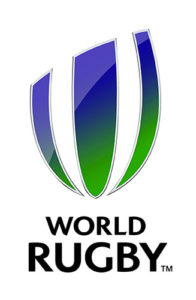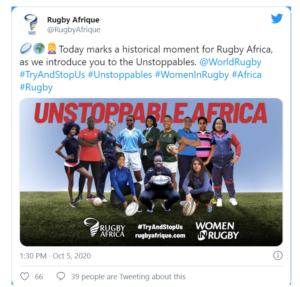
Kotze, whose father Jaco played test and sevens rugby for Namibia, is one of 12 women who have been chosen to front Rugby Africa’s ‘Try And Stop Us’ campaign.
Rugby Africa Unstoppable CJ Kotze has been surrounded by the game for as long as she can remember.
One of her earliest memories is of accompanying her father, former Namibia international Jaco Kotze, to a training session.
Watching on from the sidelines she became transfixed by the oval ball that Jaco was bouncing off the ground and catching as it ricocheted back towards him.
“I stopped and I was like, ‘How do you do that?’ And he stopped, he took about five minutes just to show me how you do it,” CJ told World Rugby. “Since then, it’s just been upwards from there.”
Kotze’s passion for rugby has remained undimmed following that early tutorial. Having played in Namibia’s inaugural women’s sevens international, and scored her country’s maiden points, Kotze dreams of one day becoming the team’s first female coach.
She began coaching in 2015, and recently started training girls at Windhoek High School, while she also works as the producer on Absolute Rugby, a Namibian magazine TV show.
Unsurprisingly, Kotze is eager to accelerate the growth of women’s rugby in Namibia, and is hopeful that Rugby Africa’s ‘Try And Stop Us’ campaign can provide the platform on which to do that.

“I’ve taken it upon myself basically to be like, ‘I’ll be that voice’. Rugby Africa has given me that opportunity now legitimately to say that I have that voice and that power to be able to say that I can make a difference in Namibian rugby right now.”
Creating history
Kotze had to wait until 2013 to find a team on which she could play. However, just nine months after joining Phoenix Rugby Club, she was selected to represent Namibia as her country made their Africa Women’s Sevens debut in Kenya.
Playing at the Kenyatta Stadium in Machakos was an extremely proud moment for Kotze, but one that would be eclipsed by events at the following year’s tournament in South Africa.
Namibia had failed to score in each of their four matches in Kenya, but put that right in their second match at the Africa Women’s Sevens 2015. It was Kotze who applied the finish on the right wing, and she then composed herself to add the conversion.
“The ball was coming out of a scrum,” Kotze said, “it came through and I got the ball and it was just open in front of me, and I started running down that line.
“A lady came from the left and instead of stepping outside and going inside, I stepped on the inside and I went out. And all the players on the bench just started chasing me, the slowest people started chasing me.
“And we all basically went to go score [together]. It was such a moment.”
Unfortunately for Kotze, that high was quickly followed by a low. In Namibia’s next match, against Zimbabwe, she suffered an ACL injury having been tackled as she attempted to kick a loose ball.
“I even had a doping test just coming out of the doctor’s room,” Kotze revealed. “So, it was such an experience, that whole tournament.
“From being on a complete high and going down on a low, and then even having a doping test.”
Kotze, who has suffered from depression and anxiety, admits that she struggled without having the release rugby provided in the wake of her injury.
“I actually remember a few days where I just couldn’t wake up or I didn’t want to stand up,” she said. “I was just like, ‘I can’t do this’.”
Thanks to the help of an observant colleague, she switched her focus to coaching and began working with primary school-age boys.
“I had to find another way to keep my mind busy and to try and just find an escape,” Kotze explained.
“Rugby has always been a release for me in such a way where if I get to practice, it’s just absolutely letting my mind go. And for me, it was absolutely devastating to not be able to do that.
“So, I basically got forced into coaching, if you want to call it that. But, I immediately fell in love with just seeing how the boys completely grew their skills every day.”
Breaking down barriers
Coaching became more important to Kotze in 2016, when she suffered a second ACL injury.
Having recovered from the partial tear she endured a year previously, the Namibian heard her left knee pop again during an innocuous game of touch. This time the ligament had been “completely” ripped from the bone.
Following a second surgery on her knee, Kotze began to focus more fully on coaching, although the switch was not entirely straightforward.
“The most challenging thing that I’ve faced is basically trying to convince the dads that know rugby, that women can be trusted with teaching their boys the right skill sets,” Kotze said.
“That was such a big thing for me to say, ‘Listen, we should start trusting women a lot more because there’s so much untapped talent and you won’t know that till you actually see the results’.
“And I’m so thankful that I got the opportunity to coach those boys, because I think the first two years were very difficult but the third and fourth year, those last two years of the boys in primary school, were amazing.
“The fathers absolutely supported us through and through. They really gave it their all.”
Kotze received confirmation that she had become an Unstoppable on her birthday, news which has already provided benefits for the game in Namibia.
“It has created so much awareness in our rugby union because the union sent out an email to everybody in their lists and they were just congratulating me,” Kotze said.
“Clubs that didn’t know you can actually start registering women are interested now and they’re putting up their hands. They want to know what’s happening, what advice do I have for them and such.
“So I think it was of utmost importance to try and create opportunities for women.
“There’s so much untapped talent. If I didn’t get that opportunity a few years back, nobody would have known I could be in the position that I am in right now.”
